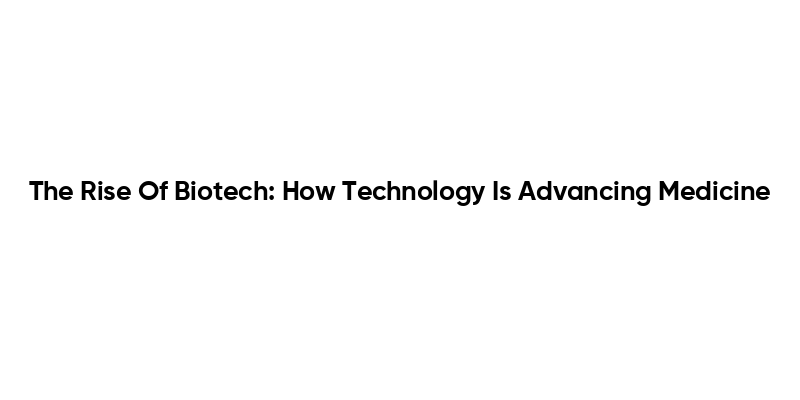In recent years, the rise of biotech has transformed the landscape of medicine, ushering in an era where technology and biology converge to create groundbreaking solutions for healthcare challenges. This dynamic field encompasses a range of innovations, from genetic engineering and personalized medicine to advanced drug development and regenerative therapies. As we delve into the intricacies of how technology is advancing medicine, we will uncover the profound impact of biotechnology on patient care, disease prevention, and overall health outcomes.
Throughout this article, you will learn about the key advancements in biotechnology that are reshaping the medical field. We will explore the role of CRISPR technology in gene editing, the promise of stem cell research in regenerative medicine, and the potential of artificial intelligence in drug discovery. Each of these topics highlights the incredible potential of biotech to not only treat diseases but also to prevent them, ultimately leading to a healthier future for all.
As we navigate through the various facets of biotechnology, we invite you to join us on this enlightening journey. Discover how these innovations are not just theoretical concepts but are actively being implemented in clinical settings, revolutionizing the way we approach healthcare. Stay with us as we uncover the exciting developments in biotech and their implications for the future of medicine.
Gene Editing: Revolutionizing Treatment Options
Gene editing technologies, particularly CRISPR-Cas9, have emerged as groundbreaking tools in the field of biotechnology. These technologies allow scientists to make precise alterations to DNA, which can lead to the treatment of genetic disorders that were previously deemed untreatable. By targeting specific genes responsible for diseases, researchers can potentially correct mutations and restore normal function, offering hope to millions suffering from hereditary conditions.
Moreover, gene editing is not limited to human health; it also has applications in agriculture and environmental conservation. For instance, genetically modified organisms (GMOs) can be engineered to withstand pests and diseases, thereby increasing crop yields and reducing the need for chemical pesticides. This dual application of gene editing highlights its potential to address both health and food security challenges in an increasingly complex world.
Personalized Medicine: Tailoring Treatments to Individuals
Personalized medicine represents a significant shift in how healthcare is delivered, moving away from a one-size-fits-all approach to more individualized treatment plans. By utilizing genetic information, healthcare providers can tailor therapies to the unique genetic makeup of each patient. This approach not only enhances the effectiveness of treatments but also minimizes adverse effects, as therapies can be selected based on a patient’s specific genetic profile.
Advancements in genomics and biotechnology have made it possible to analyze a patient’s DNA quickly and affordably. As a result, personalized medicine is becoming increasingly accessible, paving the way for targeted therapies in oncology, cardiology, and other fields. The integration of big data and artificial intelligence further enhances the ability to predict treatment outcomes, making personalized medicine a cornerstone of modern healthcare.
Biomanufacturing: The Future of Drug Production
Biomanufacturing is transforming the pharmaceutical industry by utilizing living organisms to produce drugs and biologics. This process involves harnessing the natural capabilities of microorganisms, such as bacteria and yeast, to synthesize complex molecules that are essential for therapeutic applications. The efficiency and scalability of biomanufacturing make it a promising alternative to traditional chemical synthesis methods.
As the demand for biologics continues to rise, biomanufacturing offers a sustainable solution that can meet global healthcare needs. The ability to produce vaccines, monoclonal antibodies, and other biologics in a cost-effective manner is crucial, especially in response to public health emergencies. Furthermore, advancements in automation and process optimization are enhancing the speed and reliability of biomanufacturing, ensuring that life-saving treatments are available when needed.
Regenerative Medicine: Healing Through Innovation
Regenerative medicine is an exciting field that focuses on repairing or replacing damaged tissues and organs through innovative techniques such as stem cell therapy and tissue engineering. By harnessing the body’s natural healing processes, regenerative medicine aims to restore function and improve the quality of life for patients with chronic conditions or injuries. This approach has the potential to revolutionize treatment paradigms across various medical specialties.
Stem cell therapy, in particular, has garnered significant attention for its ability to regenerate damaged tissues. Researchers are exploring the use of stem cells to treat conditions such as spinal cord injuries, heart disease, and neurodegenerative disorders. As our understanding of stem cell biology advances, the possibilities for regenerative medicine continue to expand, offering hope for conditions that currently have limited treatment options.
Digital Health: The Intersection of Technology and Medicine
Digital health technologies, including telemedicine, wearable devices, and mobile health applications, are reshaping the healthcare landscape. These innovations enable patients to monitor their health in real-time, access medical advice remotely, and engage in proactive health management. The integration of digital health tools into traditional healthcare systems enhances patient engagement and improves health outcomes.
Telemedicine, in particular, has gained prominence during the COVID-19 pandemic, allowing patients to receive care without the need for in-person visits. This shift not only increases access to healthcare services but also reduces the burden on healthcare facilities. As digital health continues to evolve, it is expected to play a crucial role in preventive care, chronic disease management, and overall health promotion.
| Aspect | Description |
|---|---|
| Introduction to Biotech | Biotechnology involves using living organisms or systems to develop products and technologies that improve human health and the environment. |
| Genetic Engineering | Advancements in genetic engineering allow for the modification of DNA to treat genetic disorders, enhance crop resilience, and produce pharmaceuticals. |
| CRISPR Technology | CRISPR-Cas9 is a revolutionary gene-editing tool that enables precise modifications to DNA, offering potential cures for genetic diseases. |
| Personalized Medicine | Biotech enables personalized medicine, tailoring treatments based on individual genetic profiles, leading to more effective therapies. |
| Regenerative Medicine | This field focuses on repairing or replacing damaged tissues and organs using stem cells and tissue engineering techniques. |
| Biopharmaceuticals | Biotech has led to the development of biopharmaceuticals, which are drugs produced using biological processes, offering targeted therapies for various diseases. |
| Diagnostics | Innovations in biotech have improved diagnostic tools, enabling early detection of diseases through advanced imaging and biomarker identification. |
| Ethical Considerations | The rise of biotech raises ethical questions regarding genetic modification, cloning, and the implications of altering life at a fundamental level. |
| Future Prospects | The future of biotech holds promise for breakthroughs in medicine, agriculture, and environmental sustainability, with ongoing research and development. |



